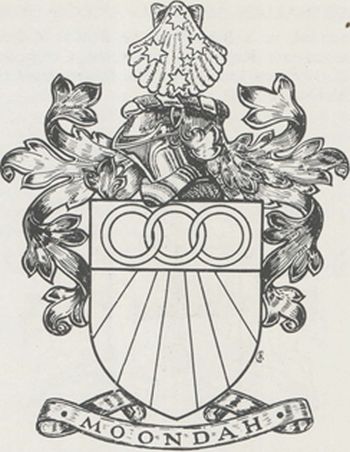Australian Administrative Staff College: Difference between revisions
Knorrepoes (talk | contribs) No edit summary |
Knorrepoes (talk | contribs) m (Text replacement - "''' :" to "''':") Tags: Mobile edit Mobile web edit |
||
| (8 intermediate revisions by the same user not shown) | |||
| Line 1: | Line 1: | ||
{{ | {{au}}''' {{uc:{{PAGENAME}}}} ''' | ||
[[File:{{PAGENAME}}.jpg|center|Coat of arms (crest) of {{PAGENAME}}]] | |||
[[File:{{PAGENAME}}.jpg|center| | |||
===Official blazon=== | ===Official blazon=== | ||
'''Arms''' : Vert, three Piles reversed converging in chief Or, over all on a Chief Azure three Annulets interlaced fesswise Or.<br> | '''Arms''': Vert, three Piles reversed converging in chief Or, over all on a Chief Azure three Annulets interlaced fesswise Or.<br> | ||
'''Crest''' : On a Wreath of the Colours, an Escallop proper charged with a representation of the Constellation of the Southern Cross composed of five Mullets Argent.<br> | '''Crest''': On a Wreath of the Colours, an Escallop proper charged with a representation of the Constellation of the Southern Cross composed of five Mullets Argent.<br> | ||
'''Motto''' : 'Moondah'. | '''[[:Category:Mottoes all|Motto]]''': 'Moondah'. | ||
===Origin/meaning=== | ===Origin/meaning=== | ||
| Line 18: | Line 16: | ||
The blue chief suggests the sea, and the three interlaced rings the idea of interdependence of the various parts of the community which the College serves. | The blue chief suggests the sea, and the three interlaced rings the idea of interdependence of the various parts of the community which the College serves. | ||
The scallop shell is a familiar product of Port Phillip Bay where the college is located, and also a common heraldic device for pilgrims and crusaders, conveying the notion of pioneer endeavour. Here it bears the Southern Cross. | The scallop shell is a familiar product of Port Phillip Bay where the college is located, and also a common heraldic device for pilgrims and crusaders, conveying the notion of pioneer endeavour. Here it bears the Southern Cross.'''[[Literature]]''': | ||
{{media}} Low, 1971 | |||
[[Category: | [[Category:Australia (universities)]] | ||
[[Category:Granted 1967]] | [[Category:Granted 1967]] | ||
Latest revision as of 06:02, 16 June 2024
Australia heraldry portal
This page is part of the Australia heraldry portal |
Heraldry of the World |
|
Civic heraldry:
|
Other heraldry: |
AUSTRALIAN ADMINISTRATIVE STAFF COLLEGE
Official blazon
Arms: Vert, three Piles reversed converging in chief Or, over all on a Chief Azure three Annulets interlaced fesswise Or.
Crest: On a Wreath of the Colours, an Escallop proper charged with a representation of the Constellation of the Southern Cross composed of five Mullets Argent.
Motto: 'Moondah'.
Origin/meaning
The arms were officially granted on October 10, 1967.
The green and gold strips refer to the diversity of participants in College Sessions, and are drawn in a perspective which suggests that they are going onward 'over the horizon', which is said to be the meaning of the aboriginal word 'Moondah'.
The colours are those often used for Australian enterprises, for example on the sporting field. Green is the chosen colour of the Administrative Staff College at Henley-on-Thames (UK), after which the college is formed.
The blue chief suggests the sea, and the three interlaced rings the idea of interdependence of the various parts of the community which the College serves.
The scallop shell is a familiar product of Port Phillip Bay where the college is located, and also a common heraldic device for pilgrims and crusaders, conveying the notion of pioneer endeavour. Here it bears the Southern Cross.Literature:
Contact and Support
Partners:
Your logo here ?
Contact us
© since 1995, Heraldry of the World, Ralf Hartemink 
Index of the site Low, 1971












